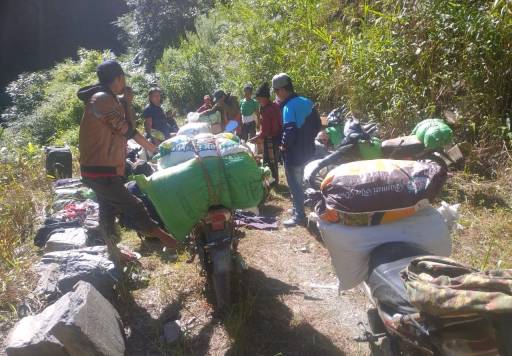The Global Naga Forum initiated and carried out the Shilloi Relief & Peace mission (Nov. 6 – 8) for Nagas in Myanmar who are living in conditions of extreme deprivation, even of basic needs like food , medicines and warm clothes. Many lack proper housing, some are made to do forced labour by government agents, and they live under constant threat from security forces, including villages being attacked on suspicion of anti-government activity, forced lockdowns due to the pandemic. It was in view of these conditions that GNF members from both sides of the border planned the relief mission. Twenty-one volunteers travelling from both ends coordinated their efforts and met in Shilloi to transfer the donated goods to those with urgent needs.
One of the joys in this labour of love for GNF was seeing — and now bearing public witness to –the spontaneous generosity of our people: church communities, the public, GNF members. They donated loads of blankets, warm clothes, shoes, rice, dal, and salt, face masks, sanitizers, over-the-counter medicines, other user-friendly daily utilities donated by Nagas from near and far. GNF saw first-hand an outpouring of the Naga spirit of giving and community. GNF is deeply grateful to every donor and well-wisher.
The group travelling to Shilloi and back were warmly received and helped by local and civil society leaders, the Pochury Mothers Association, Pochury Students’ Union leaders, VCC, DB, Chairman and the Headmaster of Avakhung. GNF greatly appreciate their warm hospitality and help in the relief mission.. The spirit of Nagas as one family was evident there.
The downside of the relief mission for the GNF group travelling to Shilloi from Nagaland was being held up en-route for 45 minutes by Assam Rifles personnel, late night at Washelo and needlessly questioned about personal details and having their phones checked. They were asked to stand for photographs but they objected to it because they had done no wrong by travelling in Nagaland. Gratefully, Nagaland Home Minister Y. Patton intervened to calm the situation down. The Naga group from Myanmar was treated worse. Three Naga brothers came all the way from Layshi to collect relief materials from Shilloi ,but were apprehended by ARs, kept overnight and taken back to the border even without allowing them to carry any relief materials.

The incident brings up the larger and more troubling question about violations of basic human rights of the Naga people even in our own homeland. Peace in the region depends on mutual respect among the peoples and democratic governments. The Global Naga Forum therefore urgently appeals to all the stakeholders to uphold one another’s human rights. GNF’s Relief and Peace mission was just that – relief for the desperately needy Nagas in Myanmar and a hope for peace in the region, one step at a time.
Our mission was wholly sustained by Article 36 of the UN Declaration on the Rights of Indigenous Peoples (UNDRIPs), to which both India and Myanmar are signatories. It reads as follows:
1. Indigenous peoples, in particular those divided by international borders, have the right to maintain and develop contacts, relations and cooperation, including activities for spiritual, cultural, political, economic and social purpose, with their own members as well as other people across borders.
2. States [India and Myanmar in the Naga case], in consultation and cooperation with indigenous peoples, shall take effective measures to facilitate the exercise and ensure implementation of this right.

The question for every stakeholder then is: Why should Nagas, now under India and Myanmar, not continue to live as a people without borders?
The Naga homeland is situated between India and Myanmar, two great civilizations of the world. And Nagas have the potential to become bridge builders and peacemakers between India and Myanmar. Instead, militarization and violations of Naga people’s human rights in both countries, for over seven decades, have bedevilled peace and wellbeing in the region. We fervently hope and call for peace and justice for all the stakeholders.
(Global Naga Forum)

